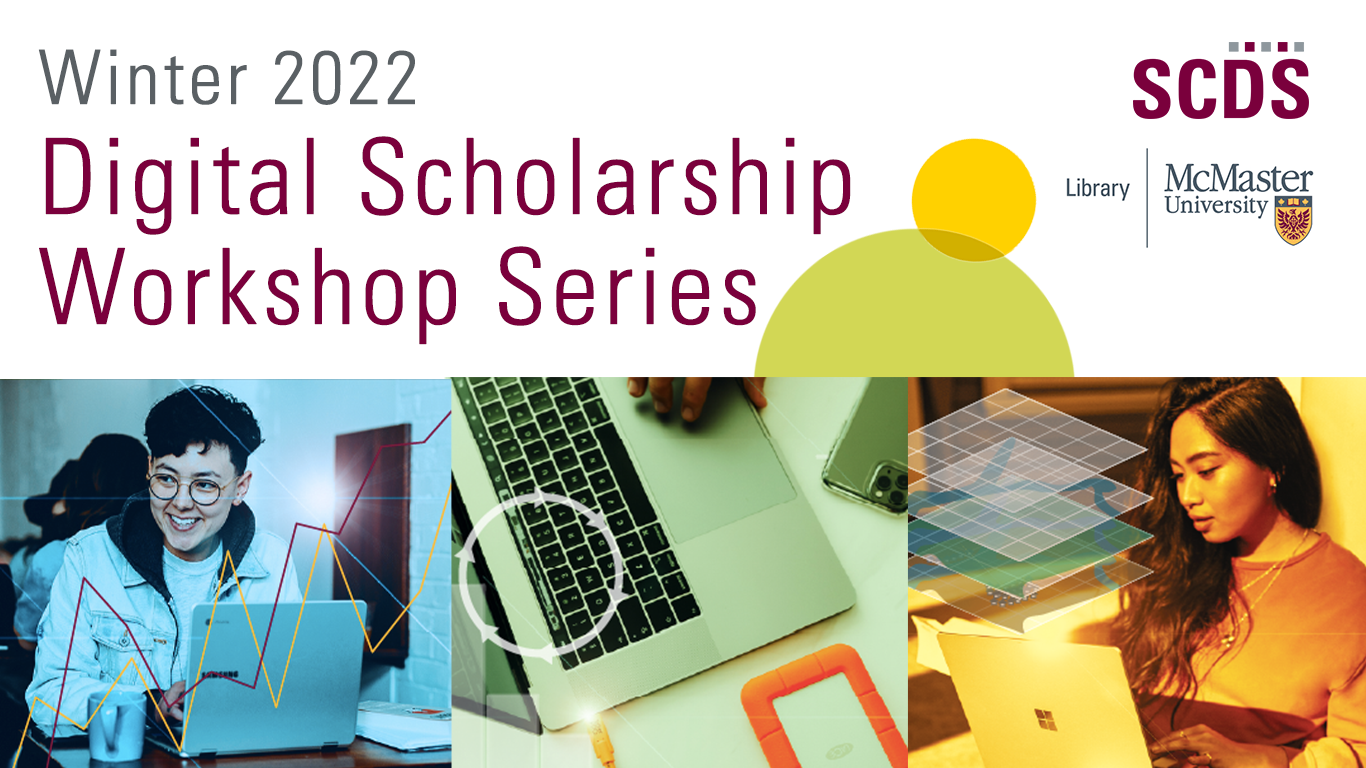
Hot on the heels of a successful fall workshop series, the Sherman Centre for Digital Scholarship is back with a slate of events for the winter.
Whether it’s an introduction to Microsoft Excel or tips on how to graph data and visualize networks with Gephi, there’s something for everyone this term.
“We’re delighted to bring the McMaster community more digital scholarship programming, including in-demand workshops on data visualization, digital humanities, and StoryMaps,” said Jay Brodeur, administrative director of the Sherman Centre. “These sessions, like many in the series, have a public scholarship component that will help teachers engage their students and researchers reach a wider audience.”
Another ongoing focus through the winter workshops is research data management, or RDM. The related events are especially timely as McMaster University develops its RDM institutional strategy.
One such must-attend session is Data Privacy Best Practices in March, focused on considerations for collecting, using, and sharing personal information. The workshop features presenter Trudi Wright, privacy and records management specialist at McMaster, with a question-and-answer session moderated by Isaac Pratt, research data management specialist.
As before, the workshops are open to everyone at McMaster — faculty, students, staff — as well as community members beyond campus. Additionally, many of this term’s workshops are beginner-friendly so that people who are new to digital scholarship can participate in helpful training opportunities.
Since the majority of the Sherman Centre’s fall workshops were fully booked, early registration is recommended. Admission to all events is free.
The Sherman Centre, based at McMaster University Library, provides digital scholarship services for research and teaching that respond to the needs of faculty and students. To learn more, visit the Sherman Centre website. Read the first issue of the Sherman Centre’s newsletter, “The SCDS Snapshot”, and sign up to receive future issues.
Winter 2022 Workshop Series
All workshops are virtual unless otherwise noted.
Visualizing Texts with Voyant Tools
Wednesday, Jan. 26, 2022 | 10 a.m.-Noon
Register
See texts in exciting new ways at this virtual workshop on Voyant Tools. Devon Mordell, educational developer at MacPherson Institute, will show participants how to transform text documents into data for visualization, helping Humanities scholars see texts from new perspectives. If you are interested in digital humanities, this workshop is a great place to start.
Best Practices for Managing Data in your Research
Wednesday, Jan. 26, 2022 | 2:30-3:30 p.m.
Register
In this introductory workshop, learn about research data management best practices and how investing a small amount of time in organizing your data now can save you a lot of time and prevent future headaches. Join Isaac Pratt, research data management specialist, and learn about best practices for data planning, storage, organization, preservation, and sharing.
Network Visualizations with Gephi
Wednesday, Feb. 2 | 10 a.m.-Noon
Register
Learn to graph data and visualize networks at this workshop on Gephi. Devon Mordell, educational developer at MacPherson Institute, will teach participants how graph data can help express relationships between entities and visualize networks for Humanities scholars. The group will use a visualization tool intended for social network analysis, Gephi, to map and identify relationships within a dataset scraped from Twitter.
Introduction to Microsoft Excel
Thursday, Feb. 3, 2022 | 1:30-3 p.m.
Register
This introductory workshop will introduce participants to the basic layout of Microsoft Excel and teach them how to navigate the software. Simran Kaur, DASH support assistant, will show participants how to enter data, overview functions and formulas, and teach the group to format cells, insert new rows, and create charts and graphs. This will be an interactive workshop, so please bring your laptop and get ready for a hands-on learning experience. No prior experience with Excel required.
Intro to Designing Effective Data Visualizations
Thursday, Feb. 10, 2022 | 1:30-2:30 p.m.
Register
An effective data visualization makes all the difference. Learn to present your research in its best light at this beginner-friendly workshop on the basic design principles and best practices that can be applied across different data visualization software and tools. Subhanya Sivajothy, data analysis and visualization librarian, will teach participants how to plan for visualizations from concept to design output, and how to incorporate thinking about dissemination of data as scholars progress in their research.
Depositing & Sharing Data Online with McMaster Dataverse
Tuesday, Feb. 15, 2022 | 10:30-11:30 a.m.
Register
Are you thinking of sharing your data for re-use by other researchers? Have you been asked to share your data by a journal or funder? Are you worried about the long-term accessibility of your data? Join Isaac Pratt, research data management specialist, for this workshop on how to deposit your data on McMaster Dataverse for archival, preservation, and sharing. Learn more about how openly sharing data can benefit you and the research community, and how online repositories are helping to improve the availability of research data.
Intro to ArcGIS Online
Thursday, Feb. 17, 2022 | 1:30-3:30 p.m.
Register
If you’ve ever thought that a map would help illustrate a critical part of your research, this workshop is for you. At this beginner-friendly session, Christine Homuth, spatial information specialist, will introduce participants to the core concepts of geographic information systems (GIS) and geospatial data, then show attendees how to apply these concepts during a hands-on exercise where the group will create a web-based map in ArcGIS Online.
LaTeX for Human(ist)s
Wednesday, March 2, 2022 | 2-3:30 p.m.
Register
LaTeX is a typesetting and document creation program that has a lot of traction in STEM areas (computer science and maths especially, due to its facility with mathematical symbols) but very little pickup with folks in the humanities. At this session, John Fink, digital scholarship librarian, will discuss why this doesn’t have to be the case. We’ll learn about how LaTeX can be used by humanities scholars and discuss topics like what makes *typesetting* different from a *word processor*, why LaTeX still has resonance today despite being invented in the 1970s, why maths nerds love the program, and why people who might ordinarily use Word might want to think about maybe not using Word.
StoryMaps
Thursday, March 3 | 1:30-3:30 p.m.
Register
Learn how to make maps tell stories with ArcGIS StoryMaps. This multimedia digital storytelling tool allows you to incorporate maps and apps from your ArcGIS account, as well as text, photos, and videos. At this workshop, Christine Homuth, spatial information specialist, will provide attendees with an introduction to storytelling through maps using ArcGIS Online and ArcGIS Storymaps. No prior knowledge of GIS is required.
Data Privacy Best Practices
Thursday, March 10, 2022 | 1:30-3 p.m.
Register
The privacy office joins the Sherman Centre RDM Webinar Series to discuss data privacy best practices, including considerations for collecting, using, and sharing personal information. We will also discuss the privacy impact assessment process, determining appropriate data storage and analyzing vendor solutions. This workshop features a presentation by Trudi Wright, privacy and records management specialist, followed by a question-and-answer session moderated by Isaac Pratt, research data management specialist.
Hypothesis Testing in Microsoft Excel
Thursday, March 10, 2022 | 1:30-3:30 p.m.
Register
In this workshop, participants will learn to perform statistical analysis with the Data Analysis ToolPak in Excel. Simran Kaur, DASH support assistant, will guide attendees through installing the ToolPak and running programs including Z-test, T-test, Analysis of Variance, and the Chi-Square test. The session will also discuss how to run a linear regression model. Because this is an intermediate level workshop focused on learning how to run different hypothesis tests in Microsoft Excel, it is important to have prior basic knowledge of Excel as well as the hypothesis testing methods.


